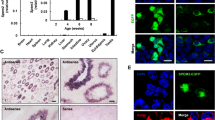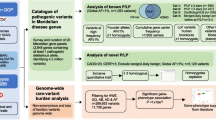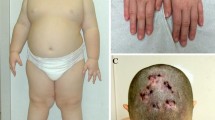Abstract
Premature ovarian insufficiency (POI) is a common reproductive aging disorder due to a dramatic decline of ovarian function before 40 years of age. Accumulating evidence reveals that genetic defects, particularly those related to DNA damage response, are a crucial contributing factor to POI. We have demonstrated that the functional Fanconi anemia (FA) pathway maintains the rapid proliferation of primordial germ cells to establish a sufficient reproductive reserve by counteracting replication stress, but the clinical implications of this function in human ovarian function remain to be established. Here, we screened the FANCI gene, which encodes a key component for FA pathway activation, in our whole-exome sequencing database of 1030 patients with idiopathic POI, and identified two pairs of novel compound heterozygous variants, c.[97C > T];[1865C > T] and c.[158-2A > G];[c.959A > G], in two POI patients, respectively. The missense variants did not alter FANCI protein expression and nuclear localization, apart from the variant c.158-2A > G causing abnormal splicing and leading to a truncated mutant p.(S54Pfs*5). Furthermore, the four variants all diminished FANCD2 ubiquitination levels and increased DNA damage under replication stress, suggesting that the FANCI variants impaired FA pathway activation and replication stress response. This study first links replication stress response defects with the pathogenesis of human POI, providing a new insight into the essential roles of the FA genes in ovarian function.



Similar content being viewed by others
Data availability
The raw sequencing data of 1030 patients with idiopathic POI in this study are available in the Genome Sequence Archive (https://ngdc.cncb.ac.cn/gsa-human/), under the accession number HRA003245 (project: PRJCA012479).
References
Agoulnik AI, Lu B, Zhu Q, Truong C, Ty MT, Arango N, Chada KK, Bishop CE (2002) A novel gene, Pog, is necessary for primordial germ cell proliferation in the mouse and underlies the germ cell deficient mutation, gcd. Hum Mol Genet 11(24):3047–3053. https://doi.org/10.1093/hmg/11.24.3047
Alavattam KG, Kato Y, Sin HS, Maezawa S, Kowalski IJ, Zhang F, Pang Q, Andreassen PR, Namekawa SH (2016) Elucidation of the fanconi anemia protein network in meiosis and its function in the regulation of histone modifications. Cell Rep 17(4):1141–1157. https://doi.org/10.1016/j.celrep.2016.09.073
Alter BP, Frissora CL, Halpérin DS, Freedman MH, Chitkara U, Alvarez E, Lynch L, Adler-Brecher B, Auerbach AD (1991) Fanconi’s anaemia and pregnancy. Br J Haematol 77(3):410–418. https://doi.org/10.1111/j.1365-2141.1991.tb08593.x
Auerbach AD (2009) Fanconi anemia and its diagnosis. Mutat Res 668(1–2):4–10. https://doi.org/10.1016/j.mrfmmm.2009.01.013
Badra Fajardo N, Taraviras S, Lygerou Z (2022) Fanconi anemia proteins and genome fragility: unraveling replication defects for cancer therapy. Trends Cancer 8(6):467–481. https://doi.org/10.1016/j.trecan.2022.01.015
Ceccaldi R, Sarangi P, D’Andrea AD (2016) The Fanconi anaemia pathway: new players and new functions. Nat Rev Mol Cell Biol 17(6):337–349. https://doi.org/10.1038/nrm.2016.48
Che R, Zhang J, Nepal M, Han B, Fei P (2018) Multifaceted Fanconi anemia signaling. Trends Genet 34(3):171–183. https://doi.org/10.1016/j.tig.2017.11.006
Dai J, Voloshin O, Potapova S, Camerini-Otero RD (2017) Meiotic knockdown and complementation reveals essential role of RAD51 in mouse spermatogenesis. Cell Rep 18(6):1383–1394. https://doi.org/10.1016/j.celrep.2017.01.024
Day FR, Ruth KS, Thompson DJ et al (2015) Large-scale genomic analyses link reproductive aging to hypothalamic signaling, breast cancer susceptibility and BRCA1-mediated DNA repair. Nat Genet 47(11):1294–1303. https://doi.org/10.1038/ng.3412
Deans AJ, West SC (2011) DNA interstrand crosslink repair and cancer. Nat Rev Cancer 11(7):467–480. https://doi.org/10.1038/nrc3088
Dorsman JC, Levitus M, Rockx D, Rooimans MA, Oostra AB et al (2007) Identification of the Fanconi anemia complementation group I gene. FANCI Cell Oncol 29(3):211–218. https://doi.org/10.1155/2007/151968
Dubois EL, Guitton-Sert L, Béliveau M et al (2019) A Fanci knockout mouse model reveals common and distinct functions for FANCI and FANCD2. Nucleic Acids Res 47(14):7532–7547. https://doi.org/10.1093/nar/gkz514
European Society for Human R, Embryology Guideline Group on POI, Webber L et al (2016) ESHRE Guideline: management of women with premature ovarian insufficiency. Hum Reprod 31(5):926–937. https://doi.org/10.1093/humrep/dew027
Fierheller CT, Guitton-Sert L, Alenezi WM et al (2021) A functionally impaired missense variant identified in French Canadian families implicates FANCI as a candidate ovarian cancer-predisposing gene. Genome Med 13(1):186. https://doi.org/10.1186/s13073-021-00998-5
Fouquet B, Pawlikowska P, Caburet S et al (2017) A homozygous FANCM mutation underlies a familial case of non-syndromic primary ovarian insufficiency. Elife. https://doi.org/10.7554/eLife.30490
Guitton-Sert L, Gao Y, Masson JY (2021) Animal models of Fanconi anemia: a developmental and therapeutic perspective on a multifaceted disease. Semin Cell Dev Biol 113:113–131. https://doi.org/10.1016/j.semcdb.2020.11.010
Hill RJ, Crossan GP (2019) DNA cross-link repair safeguards genomic stability during premeiotic germ cell development. Nat Genet 51(8):1283–1294. https://doi.org/10.1038/s41588-019-0471-2
Kato Y, Alavattam KG, Sin HS, Meetei AR, Pang Q, Andreassen PR, Namekawa SH (2015) FANCB is essential in the male germline and regulates H3K9 methylation on the sex chromosomes during meiosis. Hum Mol Genet 24(18):5234–5249. https://doi.org/10.1093/hmg/ddv244
Ke H, Tang S, Guo T et al (2023) Landscape of pathogenic mutations in premature ovarian insufficiency. Nat Med 29(2):483–492. https://doi.org/10.1038/s41591-022-02194-3
Knipscheer P, Raschle M, Smogorzewska A, Enoiu M, Ho TV, Scharer OD, Elledge SJ, Walter JC (2009) The Fanconi anemia pathway promotes replication-dependent DNA interstrand cross-link repair. Science 326(5960):1698–1701. https://doi.org/10.1126/science.1182372
Kotsantis P, Petermann E, Boulton SJ (2018) Mechanisms of oncogene-induced replication stress: jigsaw falling into place. Cancer Discov 8(5):537–555. https://doi.org/10.1158/2159-8290.Cd-17-1461
Krausz C, Riera-Escamilla A, Chianese C et al (2019) From exome analysis in idiopathic azoospermia to the identification of a high-risk subgroup for occult Fanconi anemia. Genet Med 21(1):189–194. https://doi.org/10.1038/s41436-018-0037-1
Kuznetsov S, Pellegrini M, Shuda K et al (2007) RAD51C deficiency in mice results in early prophase I arrest in males and sister chromatid separation at metaphase II in females. J Cell Biol 176(5):581–592. https://doi.org/10.1083/jcb.200608130
Li M, Zhu Y, Wei J, Chen L, Chen S, Lai D (2023) The global prevalence of premature ovarian insufficiency: a systematic review and meta-analysis. Climacteric 26(2):95–102. https://doi.org/10.1080/13697137.2022.2153033
Luo Y, Hartford SA, Zeng R, Southard TL, Shima N, Schimenti JC (2014) Hypersensitivity of primordial germ cells to compromised replication-associated DNA repair involves ATM-p53-p21 signaling. PLoS Genet 10(7):e1004471. https://doi.org/10.1371/journal.pgen.1004471
Matsuzaki K, Borel V, Adelman CA, Schindler D, Boulton SJ (2015) FANCJ suppresses microsatellite instability and lymphomagenesis independent of the Fanconi anemia pathway. Genes Dev 29(24):2532–2546. https://doi.org/10.1101/gad.272740.115
Nadler JJ, Braun RE (2000) Fanconi anemia complementation group C is required for proliferation of murine primordial germ cells. Genesis 27(3):117–123. https://doi.org/10.1002/1526-968x(200007)27:3
Nalepa G, Clapp DW (2018) Fanconi anaemia and cancer: an intricate relationship. Nat Rev Cancer 18(3):168–185. https://doi.org/10.1038/nrc.2017.116
Niraj J, Färkkilä A, D’Andrea AD (2019) The Fanconi anemia pathway in cancer. Annu Rev Cancer Biol 3:457–478. https://doi.org/10.1146/annurev-cancerbio-030617-050422
Panier S, Boulton SJ (2014) Double-strand break repair: 53BP1 comes into focus. Nat Rev Mol Cell Biol 15(1):7–18. https://doi.org/10.1038/nrm3719
Pellas TC, Ramachandran B, Duncan M, Pan SS, Marone M, Chada K (1991) Germ-cell deficient (gcd), an insertional mutation manifested as infertility in transgenic mice. Proc Natl Acad Sci USA 88(19):8787–8791. https://doi.org/10.1073/pnas.88.19.8787
Perry JR, Corre T, Esko T et al (2013) A genome-wide association study of early menopause and the combined impact of identified variants. Hum Mol Genet 22(7):1465–1472. https://doi.org/10.1093/hmg/dds551
Qin Y, Zhang F, Chen ZJ (2019) BRCA2 in ovarian development and function. N Engl J Med 380(11):1086. https://doi.org/10.1056/NEJMc1813800
Ruth KS, Day FR, Hussain J et al (2021) Genetic insights into biological mechanisms governing human ovarian ageing. Nature 596(7872):393–397. https://doi.org/10.1038/s41586-021-03779-7
Sharan SK, Pyle A, Coppola V et al (2004) BRCA2 deficiency in mice leads to meiotic impairment and infertility. Development 131(1):131–142. https://doi.org/10.1242/dev.00888
Sun X, Brieño-Enríquez MA, Cornelius A et al (2016) FancJ (Brip1) loss-of-function allele results in spermatogonial cell depletion during embryogenesis and altered processing of crossover sites during meiotic prophase I in mice. Chromosoma 125(2):237–252. https://doi.org/10.1007/s00412-015-0549-2
Tam PP, Snow MH (1981) Proliferation and migration of primordial germ cells during compensatory growth in mouse embryos. J Embryol Exp Morphol 64:133–147. https://doi.org/10.1242/dev.64.1.133
Tsui V, Crismani W (2019) The Fanconi anemia pathway and fertility. Trends Genet 35(3):199–214. https://doi.org/10.1016/j.tig.2018.12.007
van Twest S, Murphy VJ, Hodson C, Tan W, Swuec P, O’Rourke JJ, Heierhorst J, Crismani W, Deans AJ (2017) Mechanism of ubiquitination and deubiquitination in the Fanconi anemia pathway. Mol Cell 65(2):247–259. https://doi.org/10.1016/j.molcel.2016.11.005
Vanni VS, Campo G, Cioffi R et al (2022) The neglected members of the family: non-BRCA mutations in the Fanconi anemia/BRCA pathway and reproduction. Hum Reprod Update 28(2):296–311. https://doi.org/10.1093/humupd/dmab045
Vujovic S (2009) Aetiology of premature ovarian failure. Menopause Int 15(2):72–75. https://doi.org/10.1258/mi.2009.009020
Wang AT, Smogorzewska A (2015) SnapShot: Fanconi anemia and associated proteins. Cell 160(1–2):354-354.e351. https://doi.org/10.1016/j.cell.2014.12.031
Watanabe N, Mii S, Asai N et al (2013) The REV7 subunit of DNA polymerase ζ is essential for primordial germ cell maintenance in the mouse. J Biol Chem 288(15):10459–10471. https://doi.org/10.1074/jbc.M112.421966
Weinberg-Shukron A, Rachmiel M, Renbaum P et al (2018) Essential role of BRCA2 in ovarian development and function. N Engl J Med 379(11):1042–1049. https://doi.org/10.1056/NEJMoa1800024
Xu X, Aprelikova O, Moens P, Deng CX, Furth PA (2003) Impaired meiotic DNA-damage repair and lack of crossing-over during spermatogenesis in BRCA1 full-length isoform deficient mice. Development 130(9):2001–2012. https://doi.org/10.1242/dev.00410
Xu L, Xu W, Li D, Yu X, Gao F, Qin Y, Yang Y, Zhao S (2021) FANCI plays an essential role in spermatogenesis and regulates meiotic histone methylation. Cell Death Dis 12(8):780. https://doi.org/10.1038/s41419-021-04034-7
Yang X, Zhang X, Jiao J et al (2019) Rare variants in FANCA induce premature ovarian insufficiency. Hum Genet 138(11–12):1227–1236. https://doi.org/10.1007/s00439-019-02059-9
Yang Y, Guo T, Liu R, Ke H, Xu W, Zhao S, Qin Y (2020) FANCL gene mutations in premature ovarian insufficiency. Hum Mutat 41(5):1033–1041. https://doi.org/10.1002/humu.23997
Yang Y, Xu W, Gao F, Wen C, Zhao S, Yu Y, Jiao W, Mi X, Qin Y, Chen ZJ, Zhao S (2022) Transcription-replication conflicts in primordial germ cells necessitate the Fanconi anemia pathway to safeguard genome stability. Proc Natl Acad Sci U S A 119(34):e2203208119. https://doi.org/10.1073/pnas.2203208119
Yang X, Ren S, Yang J et al (2023) Rare variants in FANCJ induce premature ovarian insufficiency in humans and mice. J Genet Genomics. https://doi.org/10.1016/j.jgg.2023.03.013
Yu Y, Xu W, Wen C, Zhao S, Li G, Liu R, Chen ZJ, Qin Y, Ma J, Yang Y, Zhao S (2023) UBE2T resolves transcription-replication conflicts and protects common fragile sites in primordial germ cells. Cell Mol Life Sci 80(4):92. https://doi.org/10.1007/s00018-023-04733-8
Zeman MK, Cimprich KA (2014) Causes and consequences of replication stress. Nat Cell Biol 16(1):2–9. https://doi.org/10.1038/ncb2897
Zhang YX, Li HY, He WB, Tu C, Du J, Li W, Lu GX, Lin G, Yang Y, Tan YQ (2019) XRCC2 mutation causes premature ovarian insufficiency as well as non-obstructive azoospermia in humans. Clin Genet 95(3):442–443. https://doi.org/10.1111/cge.13475
Zhao S, Huang C, Yang Y et al (2023) DNA repair protein FANCD2 has both ubiquitination-dependent and ubiquitination-independent functions during germ cell development. J Biol Chem 299(3):102905. https://doi.org/10.1016/j.jbc.2023.102905
Funding
This work was supported by grants from the National Key Research and Development Program of China (2022YFC2703800 and 2021YFC2700100), National Natural Science Foundation of China (32170867, 32370906, 32200697 and 82371645), National Natural Science Foundation for Distinguished Young Scholars (82125014), Natural Science Foundation of Shandong Province for Grand Basic Projects (ZR2021ZD33), Shandong Provincial Key Research and Development Program (2020ZLYS02), CAMS Innovation Fund for Medical Sciences (2021-I2M-5-001), Taishan Scholars Program for Young Experts of Shandong Province (tsqn202211370) and Qilu Young Scholars Program of Shandong University.
Author information
Authors and Affiliations
Contributions
YY and SZ designed the study and guided the writing of the manuscript. LC and XH performed the experiments, analyzed the results, and wrote the manuscript. JR and CW performed the experiments. TG conducted the sequencing data analysis. FY performed the experiments and revised the manuscript. YQ and Z-JC provided guidance and supervised the research.
Corresponding authors
Ethics declarations
Conflict of interest
The authors declare no conflict of relevant financial or non-financial interest.
Consent to participate
All patients provided written informed consent.
Ethical approval
The study was designed according to the Declaration of Helsinki and approved by the Institutional Review Board of the Center for Reproductive Medicine, Shandong University (Approval No. 2019-12).
Additional information
Publisher's Note
Springer Nature remains neutral with regard to jurisdictional claims in published maps and institutional affiliations.
Supplementary Information
Below is the link to the electronic supplementary material.
Rights and permissions
Springer Nature or its licensor (e.g. a society or other partner) holds exclusive rights to this article under a publishing agreement with the author(s) or other rightsholder(s); author self-archiving of the accepted manuscript version of this article is solely governed by the terms of such publishing agreement and applicable law.
About this article
Cite this article
Cao, L., He, X., Ren, J. et al. Novel compound heterozygous variants in FANCI cause premature ovarian insufficiency. Hum. Genet. 143, 357–369 (2024). https://doi.org/10.1007/s00439-024-02650-9
Received:
Accepted:
Published:
Issue Date:
DOI: https://doi.org/10.1007/s00439-024-02650-9




